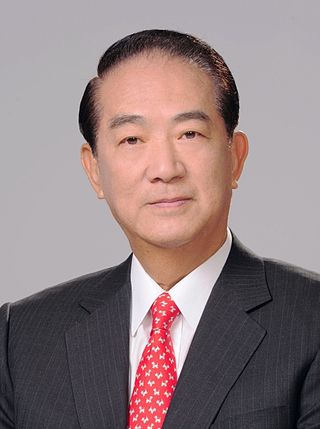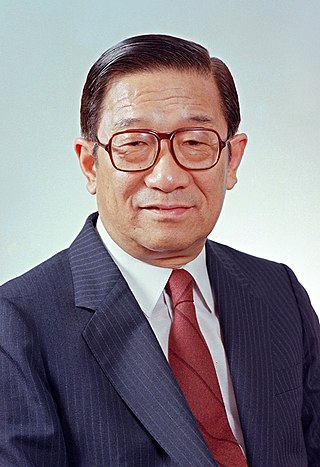
Taiwan, officially the Republic of China (ROC), is governed in a framework of a representative democratic republic under a five-power system first envisioned by Sun Yat-sen in 1906, whereby under the constitutional amendments, the President is head of state and the Premier is head of government, and of a multi-party system. Executive power is exercised by the Executive Yuan. Legislative power is vested primarily in the Legislative Yuan. Taiwan's judiciary is independent of the executive and the legislature. In addition, the Examination Yuan is in charge of validating the qualification of civil servants, and the Control Yuan inspects, reviews, and audits the policies and operations of the government.

Lee Teng-hui was a Taiwanese politician and agricultural scientist who served as the 4th president of the Republic of China (Taiwan) under the 1947 Constitution and chairman of the Kuomintang (KMT) from 1988 to 2000. He was the first president to be born in Taiwan, the last to be indirectly elected and the first to be directly elected.

The president of the Republic of China, also known as the president of Taiwan, is the head of state of the Republic of China, commonly known as Taiwan, as well as the commander-in-chief of the Republic of China Armed Forces. Before 1949 the position had the authority of ruling over Mainland China, but after communist victory in the Chinese Civil War, the remaining jurisdictions of the ROC have been limited to Taiwan, Penghu, Kinmen, Matsu, and smaller islands.

James Soong Chu-yu is a Taiwanese politician who is the founder and chairman of the People First Party. Soong was the first and only elected governor of Taiwan Province from 1994 and 1998. He was a candidate in the 2000 presidential election, which he lost to Chen Shui-bian of the Democratic Progressive Party (DPP).

Lin Yang-kang was a Taiwanese politician. He was born at Sun Moon Lake during the Japanese rule of Taiwan. Some thought he might be Chiang Ching-kuo's successor as head of the Kuomintang (KMT), but after failing to win the KMT's nomination for president in 1996, he became an independent. Lin rejoined the party in 2005, and died in 2013.
The Temporary Provisions Effective During the Period of National Mobilization for Suppression of the Communist Rebellion provisions of the Constitution of the Republic of China were effective from 1948 to 1991 and amended four times by the Central Government of China. They effectively nullified the constitution and established martial law in Taiwan, where civil and political freedoms were curtailed. The official rationale for the provisions was the ongoing Chinese Civil War. However, with the demise of the Kuomintang single-party system, the provisions were repealed.

Lee Huan was a Taiwanese politician. He was Premier of the Republic of China from 1989 to 1990, serving for one year under former President Lee Teng-hui. He was the father of Lee Ching-hua and Diane Lee. He was born in Hankou, Hubei.
Articles related to Taiwan include:

Kuo Lin-yung, is a Taiwanese politician. During his first term on the Legislative Yuan from 1984 to 1987, he was affiliated with the Kuomintang. He returned to the legislature between 2005 and 2008, representing the Taiwan Solidarity Union. He is also a lawyer who has led the Taichung Bar Association and Taiwan Bar Association, and served as deputy minister of justice. In 2010, he was a member of the Referendum Review Committee convened by the Executive Yuan.

Lee Yuan-tsu (Chinese: 李元簇; pinyin: Lǐ Yuáncù; Wade–Giles: Li3 Yüan2-tsʻu4; 24 September 1923 — 8 March 2017), was a Chinese-born Taiwanese lawyer and politician who served under Lee Teng-hui as the eighth Vice President of the Republic of China. He was of Hakka ancestry and was a member of the Kuomintang.
Events in the year 1969 in Taiwan, Republic of China. This year is numbered Minguo 58 according to the official Republic of China calendar.
Events from the year 1996 in Taiwan, Republic of China. This year is numbered Minguo 85 according to the official Republic of China calendar.
Events from the year 1991 in Taiwan, Republic of China. This year is numbered Minguo 80 according to the official Republic of China calendar.
Indirect presidential elections were held in the Republic of China on March 22, 1954 to elect the President and Vice President. The vote took place at the Chung-Shan Hall in Taipei. Incumbent President Chiang Kai-shek was re-elected for the second term. The premier Chen Cheng was elected to be the Vice-President. These were the first elections that took place since the fall of the mainland to the Chinese Communist Party in 1949.

Indirect elections were held for the presidency and vice-presidency of the government of the Republic of China on Taiwan on March 21, 1960. The vote took place at the Chung-Shan Hall in Taipei. Incumbent President Chiang Kai-shek and Vice-President Chen Cheng was re-elected.

Indirect elections were held for the presidency and vice-presidency of the government of the Republic of China on Taiwan on March 21, 1966. The vote took place at the Chung-Shan Hall in Taipei. Incumbent President Chiang Kai-shek was re-elected for the fourth term with his Vice-President Yen Chia-kan.

Indirect elections were held for the presidency and vice-presidency of the government of the Republic of China on Taiwan on March 21, 1972. The vote took place at the Chung-Shan Building in Yangmingshan, Taipei. Incumbent President Chiang Kai-shek, aged 85, was re-elected for the fifth term with his Vice President Yen Chia-kan. President Chiang died in office on April 5, 1975. Vice President Yen Chia-kan then sworn in as the President.
Indirect elections were held for the presidency and vice-presidency of the government of the Republic of China on Taiwan on March 21, 1978. The vote took place at the Chung-Shan Building in Yangmingshan, Taipei. Premier Chiang Ching-kuo, son of former President Chiang Kai-shek, was elected as the President with Governor of Taiwan Province Hsieh Tung-min who became the first Taiwan-born Vice President.

Indirect elections were held for the presidency and vice-presidency of the government of the Republic of China on Taiwan on March 21, 1984. The vote took place at the Chung-Shan Building in Yangmingshan, Taipei. Incumbent President Chiang Ching-kuo was re-elected for the second term with Governor of Taiwan Province Lee Teng-hui as the Vice President.
Kao Yu-jen or Gao Yuren is a Taiwanese politician.










